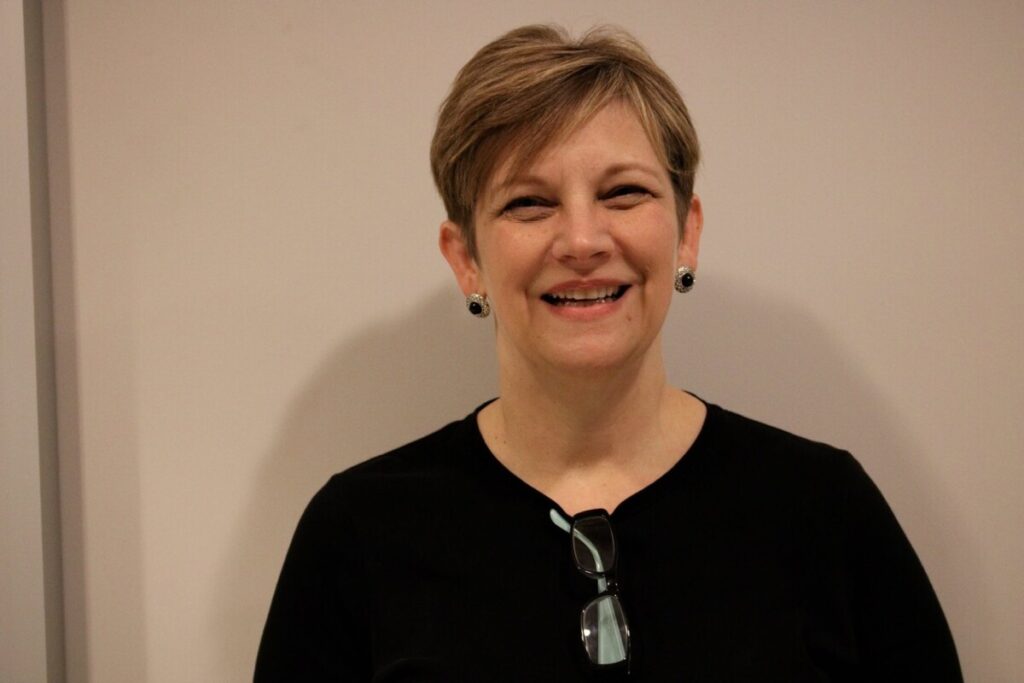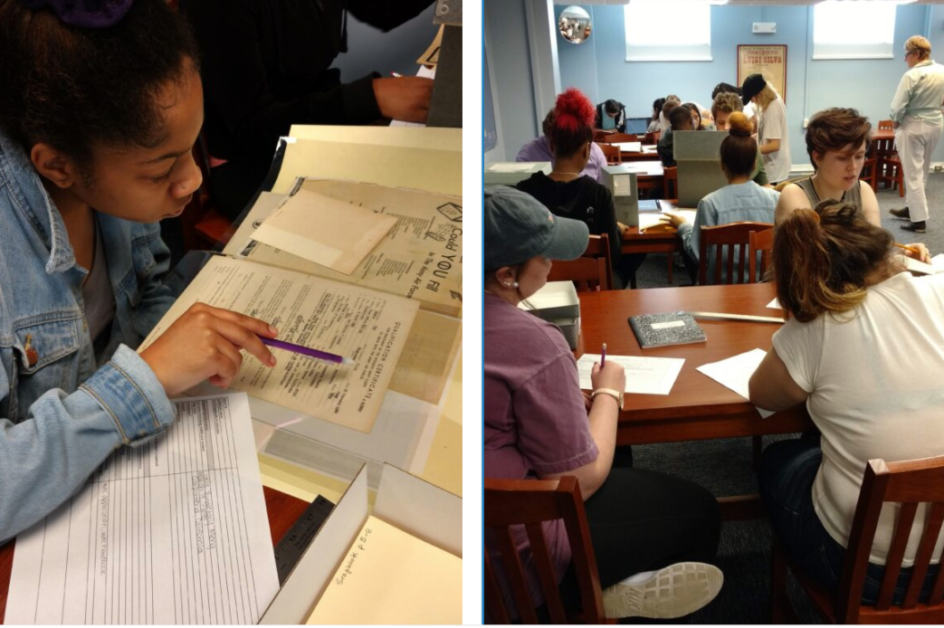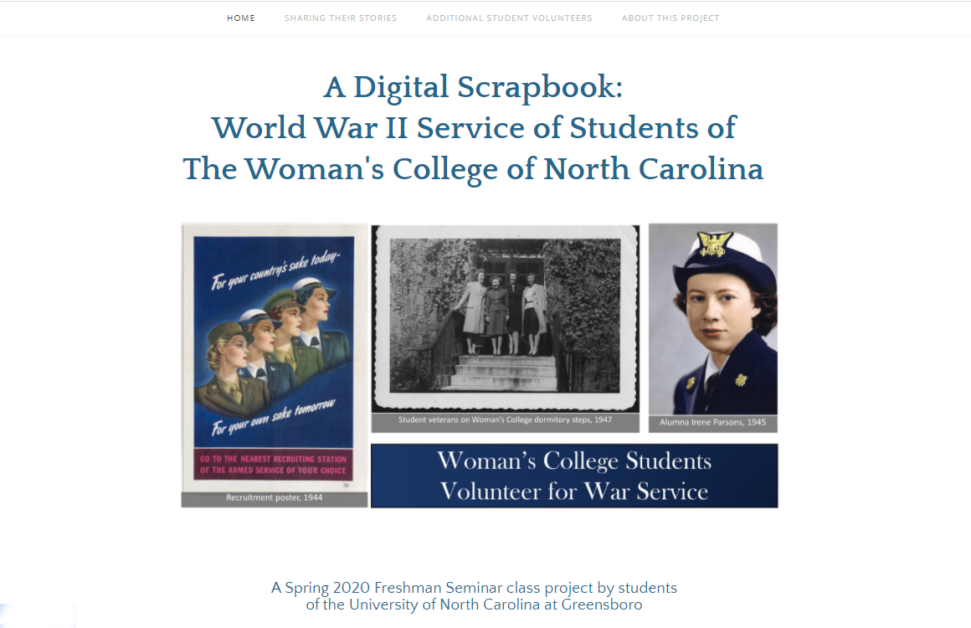by Beth Ann Koelsch

Cindy Damm McPeters (PhD Candidate) who received the 2020-2021 Hephzibah Roskelly Award for Pedagogical Innovation at UNCG, has been working with me to integrate materials from the Women Veterans Historical Project into her undergraduate classes since 2018. The award “recognizes outstanding and inventive pedagogical practice in an undergraduate academic writing course.
The Department of English announced that:
“The award recognizes Cindy’s inventive efforts to teach research to first-year students through her partnership with the libraries and especially with the Women Veterans Historical Project. As explained in her rationale, Cindy’s assignment sequence involved students in research that sparks their curiosity, as they work collaboratively to construct genres such as chronological narratives, metadata, biographical sketches, and public presentations to share original research about the women veterans whose scrapbooks are held by the Women Veterans Historical Project at UNCG Libraries. Tasked with researching non-famous individuals who can’t be readily Googled, Cindy’s students comment that they ‘feel a bit like a detective’ as they dig through archival documents to construct credible and useful introductions to veterans’ scrapbooks. In addition to motivating students’ lively engagement, Cindy’s assignment sequence also helps novice writers (in English 101 and FMS Freshmen Seminar Program 115) develop their capacities for critical reading, information literacies, and metacognition, supporting their ongoing development as writers.”
When I asked McPeters for her thoughts about our collaboration she responded:
“The WVHP is a wonderful resource, and curator Beth Ann Koelsch guided my students and me patiently through the collection. Uniforms, scrapbooks, photograph albums, diaries, formal documents, personal letters, oral histories— the project is a supply of seemingly endless research opportunities. Focusing on women veterans of World War II, my students got to know women who grappled with a challenging period in history. Through WVHP artifacts, students met women veterans as individuals, piecing together timelines by examining scrapbook entries, identifying with those who had attended UNCG (as The Woman’s College), and getting so caught up in personal letters that they sought to learn more through secondary sources. My students saw parallels between themselves and their veterans, making research in the WVHP all the more relevant and engaging.”
I have worked with McPeters since she first contacted me in April 2018 as a first-year PhD student in the Department of English about using WVHP scrapbooks in her own research for a History of Rhetoric class assignment. During our initial meeting during which I gave her a tour of the WVHP collections, I was thrilled to discover someone else who was as enthusiastic about the collections as I was. Our collaboration deepened when Cindy decided to incorporate WVHP materials into her Spring 2019 freshman seminar course “The Rhetoric of Remembering: Nostalgia and Amnesia in Public Memory.” She wanted her students to work in small groups on a project that would provide concrete benefits to the WVHP. We decided to have the students analyze a set of unprocessed scrapbooks. I pulled five scrapbooks, most of which had been purchased, and asked the students to look through them and use the materials in the scrapbook and secondary sources such as Wikipedia and genealogy websites, to create a biography of the veteran and a timeline of her military service, as well as describe the materials found in the scrapbooks. It was a very interactive project that took place over four visits to our researcher room, and the students learned about the challenges (and pleasures) of analyzing primary sources as well as developing overall course objective skills of reading and rhetorical awareness. The students did presentations about describing what they learned about scrapbooks as material rhetoric and what kinds of research these scrapbooks might support. I was able to use their research to create descriptive metadata for the collections.

In the Spring 2020 semester, she had her students use Weebly to create a Digital Scrapbook: “WWII Service of Students of the Woman’s College of North Carolina” to showcase their research. Due to the restrictions from the COVID-19 pandemic, the students’ visits to the archives were abruptly curtailed, and they did their research using digitized materials from the WVHP website.

For the Fall 2020 and Spring 2021 semesters, McPeters taught English 101 “College Writing” sections and she pivoted to have the students focus working with the oral histories in the collection by “rewriting” them in a research narrative format. This spring, the final project will be a Ken Burns style video documentary.
I love working with Cindy because her enthusiasm for both her teaching and the materials in the WVHP collections motivate her students to delve deeply into the experiences of the women whose stories are part of the WVHP.